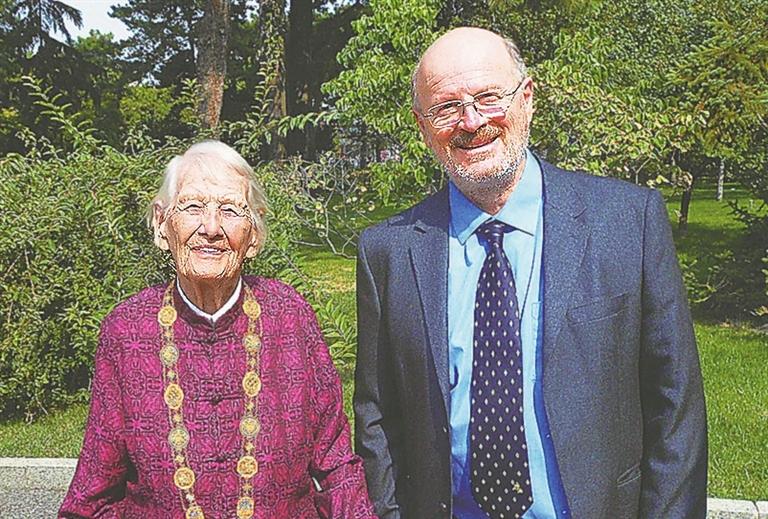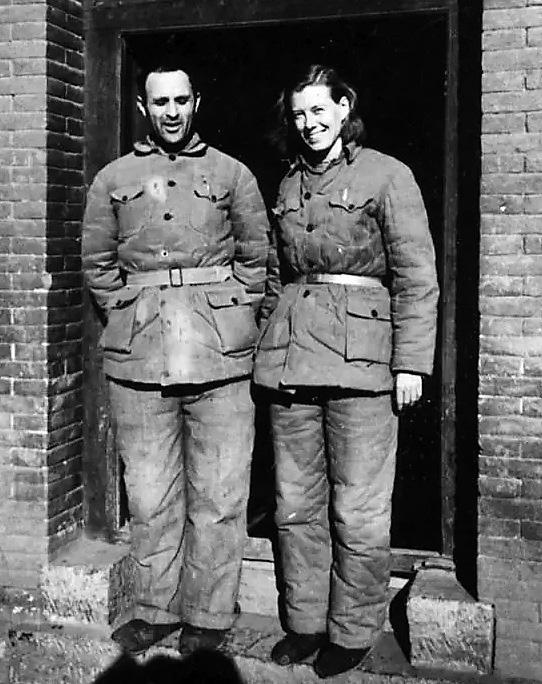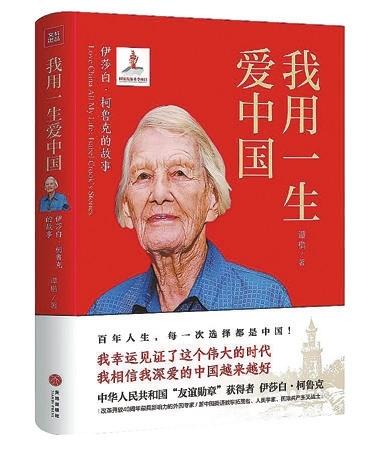


YANGZOM, 94, who comes from a rural area of Sichuan, remembers learning the nursery rhyme “Row, Row, Row Your Boat” in English more than 80 years ago. She mastered the words when Canadian expatriate Isabel Crook carried out an anthropological field study of Tibetan households in Yangzom’s home village of Bashinao, Aba Tibet and Qiang Autonomous Prefecture, Sichuan Province, in 1939. Details of Crook visiting Tibetan and Qiang villages are recorded in “Love China All My Life: Isabel Crook’s Stories,” a biography recently published by author Tan Kai. The book includes numerous anecdotes about Crook, a kindhearted, determined figure who has devoted most of her life to ethnological studies of China, the nation’s rural development and teaching English. In 2019, Crook received the Friendship Medal, China’s top honor for foreigners, for her contribution to the nation’s foreign language education. In addition to Crook’s achievements, the book takes a close look at her hard work and persistence. More important, it provides the backdrop for readers to understand why she and her husband chose to stay in China and strove to improve conditions for its people. During her time in Bashinao, Crook volunteered to teach English at a local primary school that had only eight students and one teacher. Lacking textbooks, paper and pens, she started by using simple words of greeting and games. She also let the pupils make up small plays to practice their spoken English, which attracted more children to attend the school. Crook also learned skills from the villagers, but when she saw women spinning wool into yarn by hand, she decided to return to Chengdu, capital of Sichuan, to buy them a wooden spinning wheel, which they had never heard of before. It took Crook at least seven days to travel to Bashinao from her base in Chengdu. Most of the time, she either walked or rode a horse. The route was full of hardships and danger. At one point, Crook and her companions had to traverse a cliff face for several kilometers as the Minjiang River flowed tempestuously below. They also relied on a zipline to cross the river. In the book, Crook is captured clinging to the line, laughing with great excitement as she carries the spinning wheel. Yangzom’s father Sonam Rinchen guided Crook to the village, where she lived with the family. Sonam Rinchen used to act as guide for renowned scholars from home and abroad, including Li Anzhai (1900-1985) and Zhuang Xueben (1909-1984), along with David Crockett Graham (1884-1962) and Thomas Torrance (1871-1959), who came from the United States and the United Kingdom respectively. In 2010, the then-95-year-old Crook returned to Bashinao with her family. She managed to find Yangzom, and the two resumed their close ties. In 2017, Yangzom, who was entering her 90s, visited Crook in Beijing, where they sang the nursery rhyme together again. It took Tan, 79, former editor-in-chief of the Chengdu magazine Science Fiction World, three years to complete the biography. He retraced Crook’s steps in a number of rural areas where she did research and taught. Tan also visited Crook’s hometown in Canada and interviewed a group of the anthropologist’s acquaintances. Tan said, “It felt as though I was rereading China’s modern and contemporary history, because Crook has experienced almost all the significant events.” After graduation, Crook traveled to Tibetan, Qiang and Yi villages in Sichuan for field studies. She went to Xinglongchang, part of present-day Daxing Town in the Bishan District of Chongqing, for research and rural construction experiments. In Chengdu, she met her future husband, David Crook (1910-2000), a committed communist from the U.K. and friend of the Canadian physician Henry Norman Bethune (1890-1939). He proposed to her on the Luding Bridge, which spans the Dadu River, a revolutionary site he had always wanted to visit after reading about in Edgar Snow’s book “Red Star Over China.” The couple then went to London, where they married and joined the war against Nazi Germany. After World War II, Isabel Crook attended the London School of Economics and Political Science for a doctoral program, but her studies were later suspended. In 1947, the couple traveled to Shilidian Village, Hebei Province, where they observed and joined the land reform program and wrote anthropological studies. The following year, the couple decided to stay in China and teach at what is now Beijing Foreign Studies University, at a time when the nation was in urgent need of English-language professionals. Despite only having limited resources, they took part in pioneering work on teaching and helped develop a college English-language curriculum and compile learning materials. On Oct. 1, 1949, the Crooks were on the viewing stand in Tian’anmen Square for the founding ceremony of the People’s Republic of China. When she retired in 1981, she revisited Xinglongchang with her colleague Yu Xiji. In 2013, she summarized and published a Chinese-language version of their research report, “Xinglong Chang: Field Notes of a Village Called Prosperity (1940-1942).” Works by the Crooks provided valuable texts to better understand the pre-modern-day Chinese countryside and changes in villages introduced by the Communist Party of China. Isabel Crook’s son Michael said a large number of foreigners have contributed to China, it is worthwhile documenting their experiences. Author Tan thinks that Isabel Crook’s sincere love for the Chinese people, and the public’s kindness and devotion to her family, made her and her husband decide to stay in China. Tan graduated from a primary school named after U.S. education reformer John Dewey (1859-1952). Isabel Crook’s parents took part in the school’s founding in 1915, and her mother was the school’s principal for three years. (China Daily) | 
